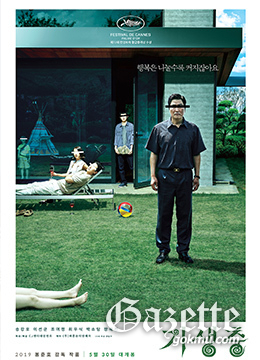
●Director: Bong Joon-ho
●Genre: Drama
●Running time: 131 munites
At the Cannes Film Festival, Korean director Bong Joon-ho’s movie “Parasite” was awarded the top prize, The Palme d’Or. This is the first time that a South Korean movie has won the Palme d’Or.
The film is a black comedy, tragic social commentary, suspense thriller and brutal bloodbath all rolled into one. Parasite tells the story of two families, one of which develops a parasitic relationship with the other. One family is wealthy (Mr. Park’s – Lee Sun-gyun), but occasionally clueless, while the other (Kim Ki- taek’s – Song Gang- ho) tries to scheme their way out of their seemingly hopeless poverty. The son of the poor family, played by actor Choi Woo Sik, counterfeits the credentials that enable him to tutor the child of the rich family. He soon makes a plan and gets his own family involved.
In the movie, the theme can be defined as ‘line’. Revolving around its main contents, there are ‘two lines’. The first ‘line’ is about the degree. It means a certain point. In human relations, we should keep basic manners. Not only that, sometimes sensible action is requested for as well. Mr. Park looks like kind outwardly, but sometimes feels displeased with Kim family. Kim family also feel displeased about Mr. Park’s rudeness that comes from bottom of his mind. His attitude, which implicitly reflects the idea that he is the strong and the people he employs are weak, drives the movie dramatically. Because they only focused on their thought related to their hierarchy. Far from sensible action, they didn’t keep minimum manner to the other person.
The second ‘line’ means hierarchy related to social stratum. If you see pyramid or hierarchical model, like India’s Caste, always there are dividing line. The lower ranker dream of them becoming the upper class. But generally it is vain hope. For example, there was the house that Mr. Park's family members already live in. Because of its expensive prices, it’s hard to approaching and buying. But Ki-woo (Choi Woo-sik) decided to buy the house to live together with Ki-taek (Song gang-ho). In fact, however, it takes 547 years for Ki-woo to buy the house even if he collects and spends no money. It shows us not just financial power’s gap that shown superficially, but clear differences in social class.
Parasite displays the extreme gap between the rich and the poor, which was developed by extreme capitalism. "I think it's irresponsible to assume that things will be good when things are not going well," the director Bong said. Many people say that “poverty is serious problem, so we should eradicate it.” But, people who lives well, don’t care about this because the problem does not affect them. He drew a conclusion honestly about – poverty, and the serious imbalance of wealth – that we don't want to admit even though it's still happening in the real world.
In this movie Parasite, there are full of suggestions for Korean society. Director Bong left the interpretation to the viewers in the direction of the open end. For that reason, the way that understanding this movie will be up to each of us. Self- interpretation is necessary from their own point of view. In addition, as the status of Korean films is increasing on the international stage, the future of Korean cinema is also drawing attention.








